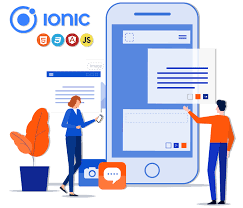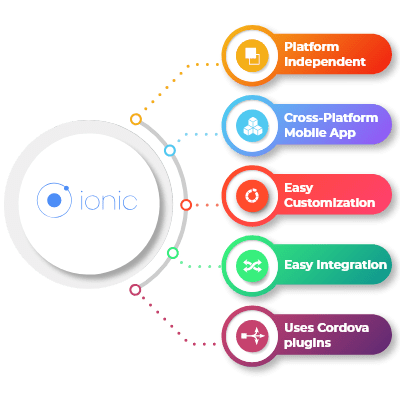
Ionic is a relatively new framework that allows you to build cross-platform applications using HTML, CSS, and Javascript. Much like other JS frameworks (such as AngularJS), it provides its own set of tools and abstractions that let developers build mobile apps faster than was possible before.
But because it’s built on top of technologies we’ve been using for years — such as Apache Cordova — we can write our app once and deploy it natively to each platform (iOS, Android, and Windows Phone).
Couple this with an easy-to-use web interface for building the frontend, and you have a powerful tool for developing hybrid mobile apps.
Out of my experience, I have outlined ten reasons why hiring an Ionic developer is a smart move for any startup or entrepreneur looking to launch their mobile application.
Whether you’re running a small company with 10 employees or 100+, Ionic developers are worth every penny.

Here are 11 reasons why they’re great hires

1. Ionic developers have a deep understanding of HTML5 and CSS3
Professional web designers know that HTML5 and CSS3 are the future of front-end development on the web.
All modern browsers support these standards, so web developers need to understand them inside-out to stay relevant. This is why it’s a great bonus for Ionic developers to have deep knowledge of HTML5 and CSS3.
In my experience, these designers tend to be highly skilled in the latest frontend technologies such as WebPack, ECMAScript 6/2015, React.js, and more.
Not only do these guys know how to build apps using AngularJS or other JS frameworks, but they’re also able to create some pretty amazing static websites that load lightning fast thanks to their knowledge of web performance optimization techniques.
2. They can help you achieve 60 FPS on mobile devices
One of the most common issues with hybrid mobile apps is that they don’t run at breakneck speeds like native ones because there are additional layers between the UI and the OS.
For example, a native app can request memory from the OS, whereas a hybrid application usually has to wait for a callback from Cordova before it can do this. This is why there are so many performance optimizations in Ionic.
For instance, if you run into trouble with your code’s performance because you’re making too many HTTP requests to load data for your app, there’s an ion-spinner directive that you can add to show a loading animation while the data loads in the background.
The core ionic development team put together some great documentation on optimizing Ionic apps to make sure they run smoothly on mobile devices.
This extra optimization level is often missing from other hybrid mobile app development frameworks, making Ionic a very attractive option for startups who care about performance.
3. Ionic developers are awesome UX/UI designers
Because they understand HTML5 and CSS3 so well, it’s common to see talented UI designers use CSS preprocessors such as LESS or Sass in their workflow.
Since the Ionic Framework relies heavily on Sass (a popular preprocessor for CSS), plenty of these front-end developers is now using it in their day-to-day work too.
This lets them set up great web design systems, write cleaner code using mixins or variables that they define themselves, and build reusable components that they can incorporate into future projects.
Identifying good design patterns and using the latest front-end development techniques will save startups a ton of time in UI/UX customization.
This can be especially important if you hire just one developer for your team because they open source templates for iOS/Swift development on GitHub, so these guys will be able to get started on your project more quickly.
4. They have a good understanding of mobile development patterns
In the olden days, most mobile apps were written in Java, but thanks to Apple’s iOS, more and more companies are turning towards native app development using Swift or Objective-C instead.
For hybrid developers who know the Ionic Framework inside-out, though, this isn’t as big of an issue anymore because they can build iOS apps (in addition to Android ones).
Since there is already plenty of great open source Ionic components on GitHub, you can choose the ones that meet your needs and customize them for any new features that you want to add.
5. Ionic app developers are already familiar with Cordova/PhoneGap
NIC is a front-end framework at its core, so building apps requires developers to use Cordova or PhoneGap.
As of right now, Cordova supports iOS and Android only, but there’s also a community-driven project called Phonegap that adds support for Windows Mobile and Firefox OS as well (so this might be worth checking out if you’re interested in developing apps for these platforms).
This kind of cross-platform compatibility was one of the first things that I loved about using Ionic, so if you’re looking for a framework that supports all major mobile operating systems, this is one of the best!
Another bonus about being familiar with Cordova/PhoneGap is tons of resources to help developers at all skill levels.
For example, it doesn’t get any easier than following the official PhoneGap documentation, which starts with setting up your computer and ends with publishing finished apps to app stores. Suppose you need more specialized help beyond that.
In that case, though, I also recommend checking out free online courses on platforms like Udemy or Coursera because they’ll teach anyone (even complete beginners) how to build full-featured hybrid mobile apps in JavaScript (HTML5). It’s worth checking out if you’re interested!
6. Ionic Developers are updated with the latest tools
Until recently, both Ionic 1 and Cordova were on version 3, but expert developers are now required to access all of Angular’s new features to use version 4. x of Ionic Framework (and at least one major update behind Cordova).
Luckily for everyone involved, though, this change has brought a lot of improvements that make developing hybrid apps even easier/faster than before.
For example, native push notifications were already supported by default, but they’ve also added support for progressive web apps, so developers can easily add offline support as well.
With so much extra work being done under the hood, it’s worth checking out!
While Ionic Framework is built in Angular, it’s still possible to build apps in vanilla JavaScript or plain old CSS.
This goes to show that these guys are constantly working hard to improve their products, so if you want a framework that offers long-term support for all of your projects, this would be my top pick!
7. The Ionic team works closely with the community
Since this Framework was first released back in 2013, thousands of developers have used it to build over 1.3 million mobile apps and websites, so there’s a huge number of different tutorials and courses for beginners floating around on the internet (to date, I’ve personally written over 90+ articles on Ionic here on Sitepoint).
If you learn better by watching videos instead, though, then definitely make sure to check out all of their official tutorial videos before reading any further because they go into great detail about how to use many of the most popular plugins.
For example, this video teaches beginners to import Google Maps into an Ionic app. This one covers everything you need to know about styling Ionic with popular CSS frameworks.
Speaking of the community, though, it’s awesome being a member of such a helpful group! Whenever I’ve encountered a problem over the past few years, someone on Stack Overflow was always able to help me, so don’t be afraid to ask questions whenever you feel stuck.
The good news is that since every developer in the world uses GitHub these days, it’s become really easy for anyone to contribute code back to open source projects like this one.
If you’d like to see a complete list of all current issues, then you can check them out here or take a look at their official Contributing guide if you’d prefer something more high level.
8. The core team is made of former Google employees
Ben Sperry and Max Lynch created ionic after working for several years at Google, building HTML5 apps that used every single one of the company’s native mobile APIs (like YouTube, Drive, Gmail, etc.).
They were already familiar with the pitfalls of reimplementing existing features using web technologies, so they decided to create a mobile framework that developers could use instead.
Ionic Framework was officially released in February 2014, and it quickly became one of the most popular hybrid app development tools in the world just a few years later.
Suppose you’re curious about what went into creating this project. In that case, I recommend reading through their original launch post on the official blog for an in-depth look at their motivations behind building Ionic.
9. There are several other options to choose from now too!
One thing that’s always bugged me about Ionic is that it’s the only major Framework built specifically for hybrid app development, so if you’ve ever tried learning Angular or any other JavaScript library, you might have noticed that everything is written in ES2015.
This has been a problem for me since day one.
Even though I love Angular, vanilla JavaScript offers many advantages like time-travel debugging and code readability. While looking through the documentation recently, I couldn’t help but notice how similar both React Native + Expo are to Ionic Framework at first glance.
They all share the same underlying philosophy of using web technologies, so it’s worth checking out if you’re curious about what else is available.
Also, don’t forget that there are tons of other players in this space now, too, so don’t be afraid to search around and see what else might work for you.
React Native looks like a great option, but I’ve never tried learning it myself because I’m already too familiar with JavaScript (although Expo does look cool since it comes bundled with most apps by default).
Microsoft has also been working on their version of Xamarin, which is another good choice (and they even offer free Mac software/IDEs to help developers learn), although I prefer using my iPad Pro + VSCode these days instead.
10. There’s a huge market for hybrid app development
The official Ionic Framework documentation is an awesome place to learn more about the project and its community because it’s built with Vue.js instead! Since the Framework was first released, it’s also been rewritten from scratch and rebranded as “Ionic 4,” so now there are two versions of this tool in active development which have been bundled together as “the Ionic Platform.”
If you want to take advantage of all the latest features, developers must upgrade their apps from Ionic Framework 3 to Ionic Platform 2.
Thankfully though, there has been a concerted effort by the team to ensure that won’t be too difficult since the two versions are quite similar.
While looking for other articles that might talk about learning Ionic, I’ve found that the market for this type of app is huge!
There are currently over 7 million apps in both Apple’s App Store, and Google Play created using this Framework, so it pays to learn more about what you can do with it if you’re interested in getting started.
Below, I’ve included examples of high-profile companies using Ionic Framework to power their hybrid apps, including Alibaba Group, General Electric, Ford Motors, Nike, Philips Healthcare, Salesforce Lightning Experience Mobile, etc.
Keep in mind that since most of these apps were designed specifically for B2C interactions, it might not be easy to find good examples of Ionic Framework in action, which were created for other types of industries.
11. There are lots of opportunities to get involved with the community
As someone who has worked with Angular 2+ before then, you’ll feel right at home when using Ionic 4 because it still relies heavily on TypeScript. The Framework is also completely open-source, so if you’re interested in getting involved with the project, developers will want to check out their official GitHub page here.
You can also learn more about upcoming releases by heading over to the team’s blog, where they share news articles every couple of weeks or so. It should go without saying that since this is an open-source project, there are certain guidelines that all contributors must follow, so it’s always good to read up on those before starting too.
Since the tool was first released, Ionic has continued to grow quite a bit, and now there are over 260 pages of documentation across 10 different sections, which have been split into two primary collections called “Quick Start” and “Advanced Theming.”
As someone who likes to learn by example, I’ve found that these guides can be extremely useful for quickly learning how to create hybrid applications, especially if you already understand the basics like HTML/CSS/JS. While this might seem simple at first, some advanced techniques will make your apps stand out from the rest, but fortunately, there is an entire section dedicated to that one goal (with videos too).
Some articles might be a bit more advanced, but they can still offer some benefits to developers who want a good overview of what else is possible with the Framework.
Conclusion
As you can see, there are many reasons for you to hire an Ionic app development company to start hiring ionic developers and using hybrid mobile development instead of sticking with native app development. By offloading some existing code into web technologies, dedicated developers get the chance to focus more on other areas while also making future updates easier to do.
There are a lot of different frameworks out there that can be used to build hybrid apps, but if you want a framework that truly offers a lot of value for your money, Ionic Framework is probably the best one on the market right now!
All in all, Ionic Framework provides lots of great features for building mobile apps and makes cross-platform app development much easier than before. Contact us today if you want to know more about ionic app development from the experts. We are a Mobile App Development Company, happy to brainstorm ideas with you.
Abhinav Sathyamurthy is a professional blogger with over six years of experience covering technical topics such as blockchain, ERP, AI, and other matters.

